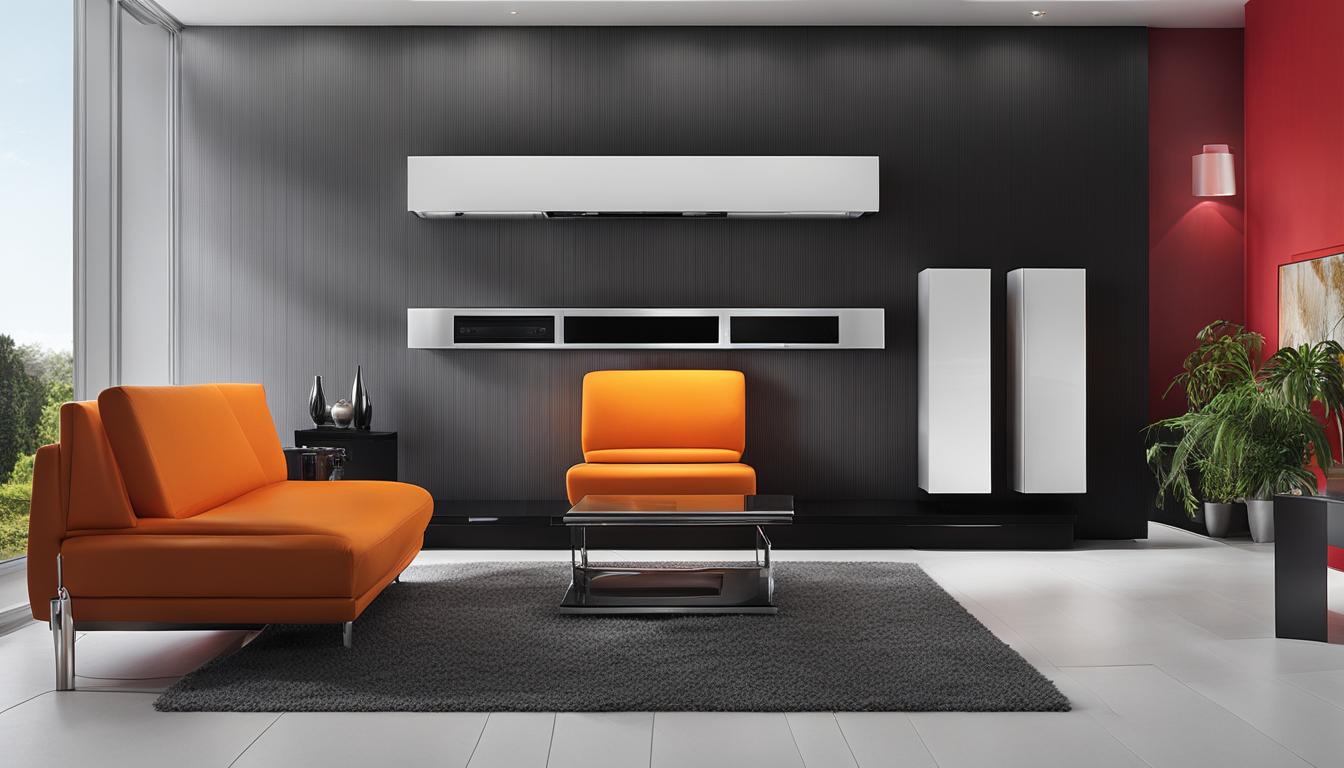Heat pump water heaters work by transferring heat from the air to your water using refrigeration principles. They rely on refrigerants that absorb heat as they evaporate, then get compressed to increase their temperature. The hot gas releases heat to the water through condensation, and an expansion valve controls flow for efficiency. By moving heat instead of generating it directly, they save energy. If you keep exploring, you’ll discover the fascinating physics that make these systems so effective.
Key Takeaways
- Heat pump water heaters transfer environmental heat to water using refrigeration cycles rather than generating heat directly.
- They utilize refrigerants that absorb heat from air during evaporation and release it during condensation.
- Compression increases refrigerant pressure and temperature, enabling efficient heat transfer to water in the condenser.
- The expansion valve lowers refrigerant pressure and temperature, regulating flow and optimizing heat absorption.
- Overall efficiency relies on thermodynamic principles, minimizing energy use by moving heat instead of producing it directly.
Basic Principles of Thermodynamics in Heat Pump Technology
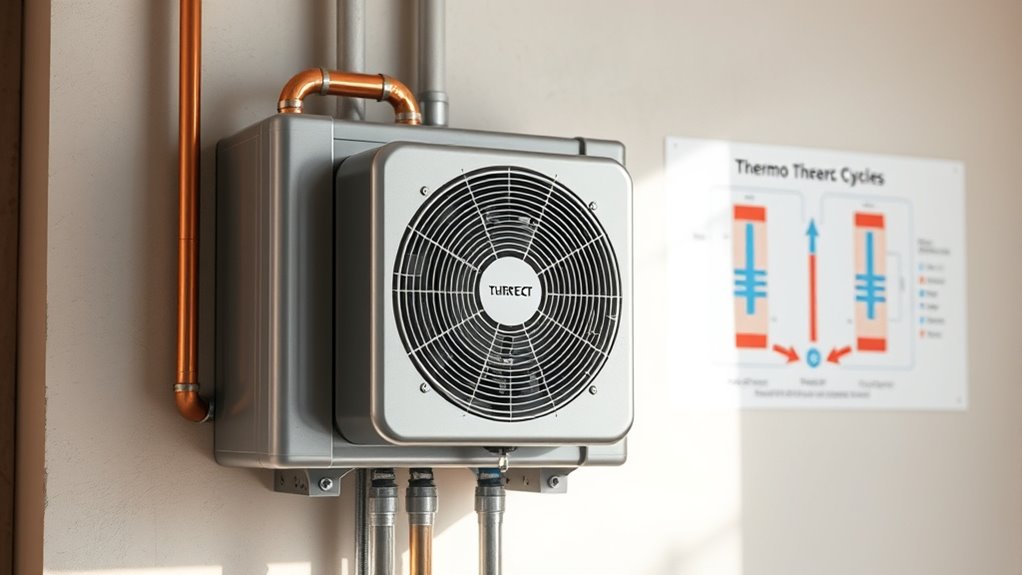
Understanding how heat pump water heaters work begins with the basic principles of thermodynamics. You need to grasp that heat naturally flows from hot to cold, and this movement can be harnessed efficiently. In a heat pump, a refrigerant absorbs heat from the surrounding air, even at low temperatures, and transfers it indoors to heat water. This process relies on the conservation of energy, meaning the heat taken from the environment is converted into usable heat for your water heater. By applying the second law of thermodynamics, you understand that moving heat requires less energy than generating heat directly. This clever use of thermodynamic principles makes heat pump water heaters an energy-efficient choice for modern households. Understanding heat transfer is fundamental to grasping how these systems maximize efficiency. Additionally, the concept of energy conservation underpins the efficiency gains achieved by heat pump technology. Recognizing how heat transfer methods occur in these systems further highlights their effectiveness and energy savings. Moreover, the efficiency of heat transfer depends on the temperature difference between the heat source and the water, which impacts overall performance. A thorough understanding of refrigeration cycle components also enhances comprehension of their operation and efficiency.
The Role of Refrigerants in Heat Transfer
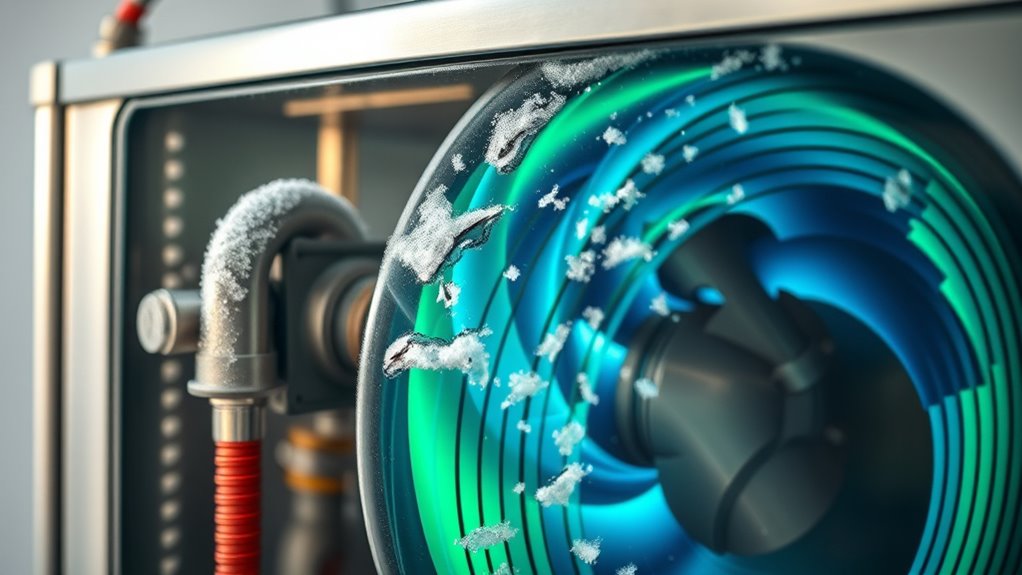
Have you ever wondered how heat effectively moves from the air into your water heater? It all relies on refrigerants, which are specially designed fluids that transfer heat efficiently. These chemicals cycle through compression and expansion, absorbing heat from the air and releasing it into the water. Refrigerants change states from liquid to vapor and back, carrying thermal energy with them. Their unique properties allow for maximum heat transfer with minimal energy. Here’s a simple overview:
| Step | Process | Role in Heat Transfer |
|---|---|---|
| Evaporation | Liquid to vapor | Absorbs heat from air and other sources |
| Compression | Vapor compressed | Raises temperature and pressure |
| Condensation | Vapor to liquid | Releases heat to water |
| Expansion | Pressure drops | Prepares refrigerant for next cycle |
Additionally, the choice of refrigerant impacts the efficiency and environmental footprint of heat pump water heaters. Understanding the refrigerant cycle is crucial for optimizing system performance and sustainability. The efficiency of this cycle can be further enhanced by advancements in refrigerant technology, which aim to balance performance with environmental considerations.
How Heat Is Absorbed From the Air
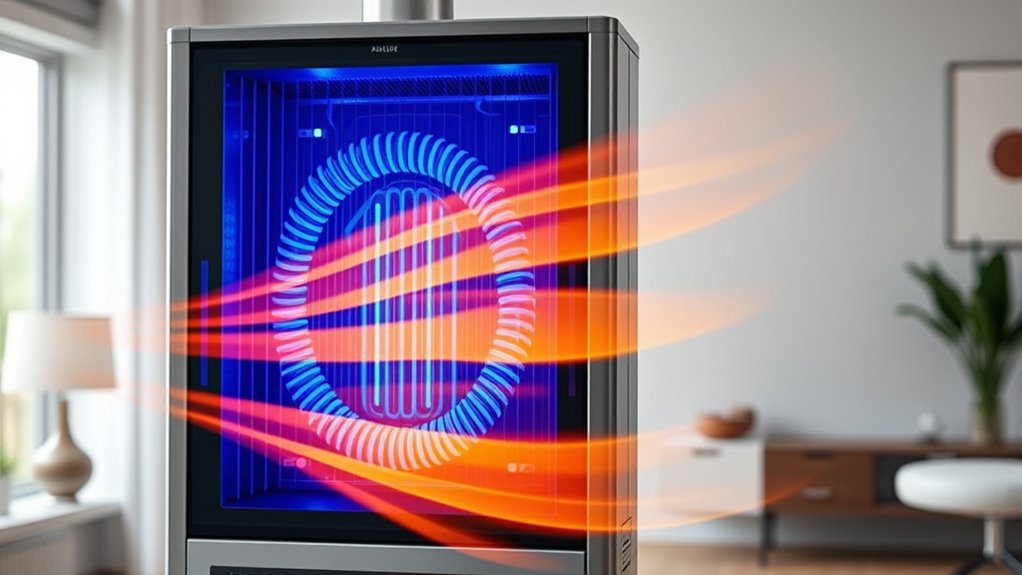
When heat is absorbed from the air, the refrigerant enters the evaporation stage as a low-pressure liquid. This process begins as the refrigerant flows through the evaporator coil, which is exposed to the surrounding air. The refrigerant absorbs heat energy from the air, causing it to evaporate into a gas. To understand this better, consider:
- You place the coil in a warm environment, like a basement or outdoors.
- The refrigerant, cold and low-pressure, starts to gain heat from the air.
- As it absorbs heat, the refrigerant changes from a liquid to a gas.
- This phase change captures thermal energy, preparing it for the next cycle.
- The efficiency of this process benefits from advancements in smart home devices that optimize energy use and system performance.
- Modern heat pump systems incorporate variable-speed compressors, which adapt to fluctuating conditions for enhanced efficiency.
- The air temperature significantly influences the amount of heat that can be extracted during this process, impacting overall performance.
- Additionally, understanding the relationship between heat transfer and system efficiency helps in optimizing heat pump performance.
The Compression Cycle and Its Effect on Heat Generation
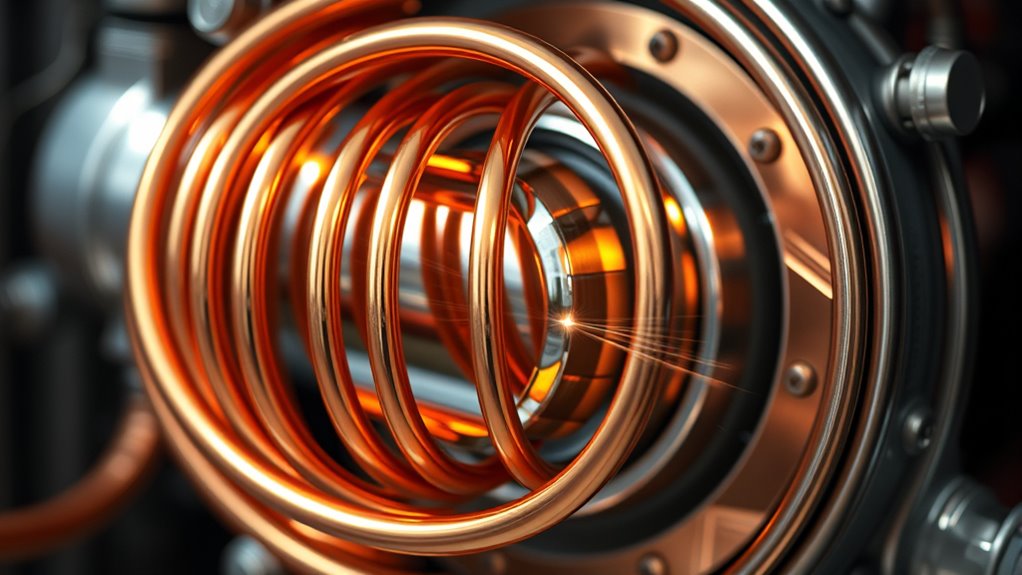
After the refrigerant absorbs heat and turns into a gas, it moves into the compression cycle, where its pressure and temperature are increased. A compressor then squeezes the gas, raising its pressure substantially. As you do this, the molecules are forced closer together, which causes the temperature to rise due to increased molecular collisions. This process makes the refrigerant much hotter than its surroundings, setting the stage for heat transfer. The higher pressure and temperature mean the refrigerant can release heat efficiently later in the cycle. Essentially, compression acts as the engine that amplifies the refrigerant’s ability to generate heat, making it a vital step for the heat pump’s overall efficiency. Without effective compression, the system wouldn’t produce enough heat for your water heater. Proper system design ensures that the compression cycle maximizes heat transfer efficiency and system performance. Additionally, advancements in compression technology can further improve the overall effectiveness and energy efficiency of heat pump water heaters. Employing efficient compressors can reduce energy consumption and improve system longevity. Moreover, understanding the thermodynamic principles involved helps optimize system operation for better performance and energy savings.
The Condensation Process and Heating the Water
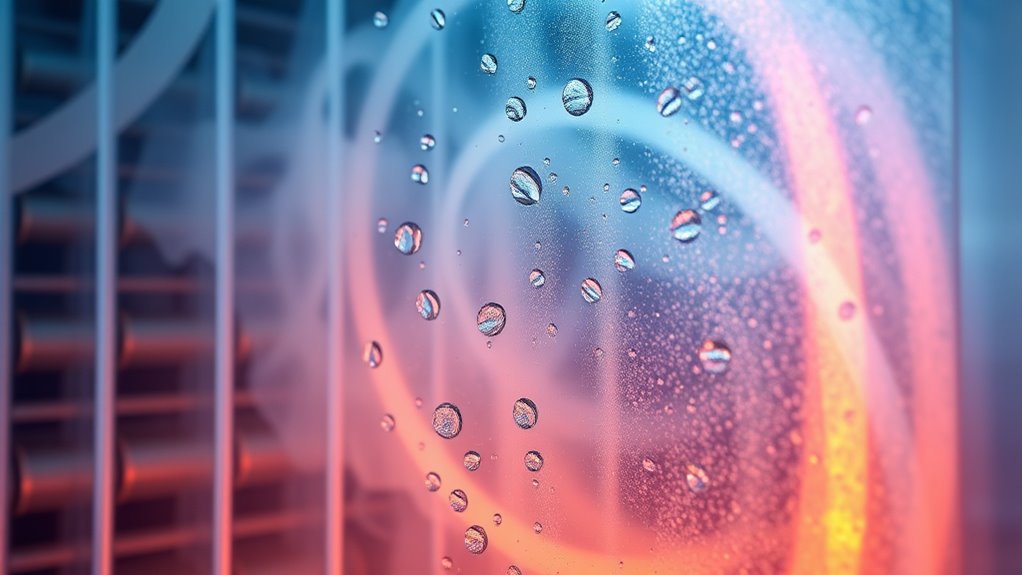
As the high-pressure, high-temperature refrigerant reaches the condenser coil, it begins to cool down and release heat. This heat transfer warms the surrounding water, raising its temperature. You can think of this process as the refrigerant giving off its stored thermal energy to the water. During this stage, several key things happen:
- The refrigerant condenses from a gas back into a liquid.
- Heat is transferred from the refrigerant to the water in the tank.
- The water temperature gradually rises as it absorbs the released heat.
- The refrigerant continues to cool until it’s ready to cycle back through the system.
- This process exemplifies the principles of thermal transfer that make heat pump water heaters energy-efficient.
The Expansion Valve and Its Function in the System

The expansion valve plays a critical role in the heat pump system by regulating the flow of refrigerant between the condenser and the evaporator. It reduces the high-pressure liquid refrigerant to a low-pressure, cold mixture that absorbs heat from the environment. This process creates the necessary temperature difference for heat transfer. The valve controls refrigerant flow based on system demand, guaranteeing ideal performance and preventing damage.
| Function | Effect |
|---|---|
| Reduces pressure | Lowers refrigerant temperature |
| Regulates flow | Maintains system efficiency |
| Controls refrigerant rate | Prevents compressor overload |
| Ensures heat absorption | Maximizes heat transfer to water |
Efficiency Factors and Environmental Impact
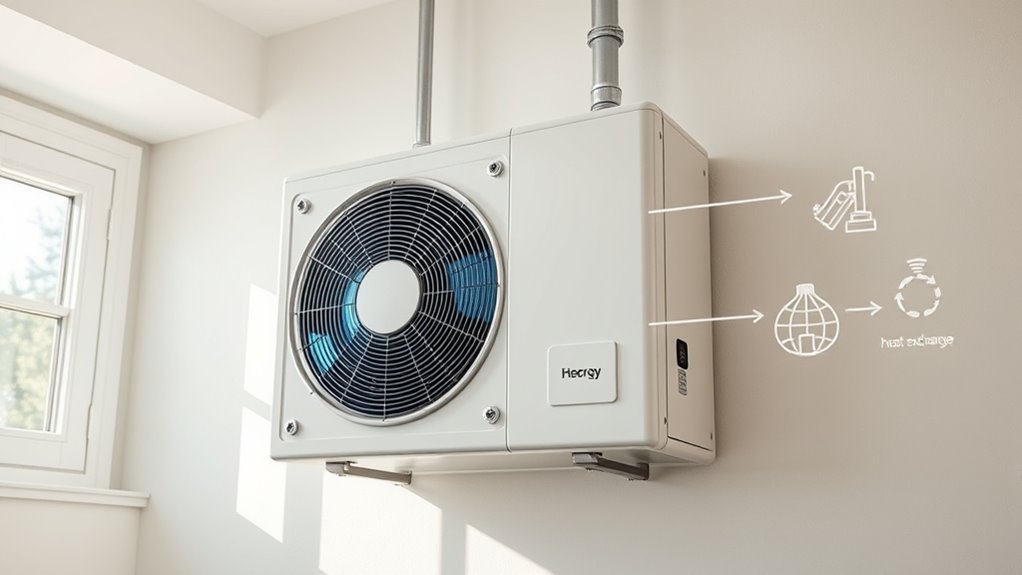
Understanding how heat pump water heaters use energy helps you see their efficiency benefits. By reducing greenhouse gas emissions, they support a greener environment. Considering the costs and savings, you can decide if their environmental advantages outweigh initial investments.
Energy Consumption Dynamics
Have you ever wondered how efficiently heat pump water heaters convert energy into hot water and what impact they have on the environment? Their energy consumption depends on several factors:
- Coefficient of Performance (COP): Higher COP values mean better efficiency, as more heat is transferred per unit of electricity.
- Temperature Differentials: The smaller the difference between source and output temperatures, the less energy you use.
- Usage Patterns: Frequent, high-demand use increases overall energy consumption.
- Environmental Conditions: Cooler ambient temperatures reduce efficiency, making the heater work harder.
Greenhouse Gas Reduction
Since heat pump water heaters operate more efficiently under certain conditions, their ability to reduce greenhouse gas emissions hinges on these factors. When you use them, they consume less electricity compared to traditional water heaters, leading to fewer fossil fuel-based emissions. This efficiency means that, even if your local power grid relies on fossil fuels, your overall carbon footprint decreases. Additionally, because heat pumps transfer heat rather than generate it directly, they produce fewer greenhouse gases per unit of hot water. The environmental benefits are maximized when your electricity comes from renewable sources, further lowering emissions. As a result, by choosing a heat pump water heater and supporting cleaner energy, you contribute markedly to reducing your household’s greenhouse gases and supporting a healthier environment.
Cost-Benefit Analysis
Evaluating the cost and benefits of heat pump water heaters reveals that their efficiency is a key advantage, especially when considering long-term savings and environmental impact. You’ll notice several benefits:
- Reduced energy bills, since they use less electricity than traditional models.
- Lower greenhouse gas emissions, helping you minimize your carbon footprint.
- Longer lifespan, which means fewer replacements and maintenance costs.
- Incentives or rebates available in many regions, offsetting initial investment.
Comparing Heat Pump Water Heaters to Traditional Systems

When comparing heat pump water heaters to traditional systems, you’ll notice significant differences in energy efficiency and operating costs. Heat pump models typically use less energy, saving you money over time, but they may require higher upfront costs and specific installation conditions. Understanding these factors helps you choose the best system for your needs.
Energy Efficiency Differences
Heat pump water heaters are generally more energy-efficient than traditional electric or gas water heaters because they transfer heat rather than generate it directly. This means they use less electricity or fuel to produce the same amount of hot water. Here’s why:
- They extract heat from the air, making use of ambient energy.
- They have higher Coefficient of Performance (COP), often 3 or above, meaning they produce three times more heat energy than the electricity they consume.
- They operate at lower power levels, reducing energy waste.
- They can recover hot water faster, saving energy during peak demand.
As a result, heat pump models typically use 50-70% less energy than traditional systems, saving you money on utility bills while reducing environmental impact.
Cost and Installation
Installing a heat pump water heater typically involves higher upfront costs compared to traditional electric or gas units, but the investment can pay off through lower energy bills over time. The initial expense ranges from $1,500 to $3,500, depending on the model and installation complexity. Traditional systems often cost less initially but have higher ongoing operational costs. Installation of heat pumps may require additional space and proper ventilation, but they generally need less maintenance. Here’s a comparison:
| Aspect | Heat Pump Water Heaters | Traditional Electric/ Gas Units | Savings Potential |
|---|---|---|---|
| Initial Cost | $1,500 – $3,500 | $800 – $1,500 | Higher upfront |
| Operating Cost | Lower | Higher | Long-term savings |
| Installation Requirements | Space & ventilation | Less space needed | Flexibility |
| Maintenance | Moderate | Usually lower | Varies |
| Lifespan | 10-15 years | 8-12 years | Comparable |
Frequently Asked Questions
How Long Does a Heat Pump Water Heater Typically Last?
You’re probably wondering how long your heat pump water heater will last. Typically, it’s about 10 to 15 years, but this can vary based on usage, maintenance, and water quality. Regular upkeep, like cleaning filters and checking for leaks, helps extend its lifespan. If you notice decreased efficiency or frequent repairs, it might be time to contemplate replacing it to keep your hot water running smoothly.
Can Heat Pump Water Heaters Operate Effectively in Cold Climates?
You might wonder if heat pump water heaters work well in cold climates. They can, but their efficiency drops as outdoor temperatures fall. Modern models include features like defrost cycles to help operate effectively in colder weather. If you live in an especially cold area, you may need a heater designed for low temperatures or consider placing it in a warmer space, like a garage or insulated utility room, to guarantee peak performance.
What Maintenance Is Required for Optimal Performance?
Imagine your heat pump water heater as a car needing regular tune-ups. To keep it running efficiently, you should clean or replace the filters monthly, especially if you have dusty conditions. Also, check the outdoor unit for debris or obstructions quarterly. Regular maintenance ensures your unit operates at its best, saving energy and extending its lifespan. Staying proactive keeps your hot water supply reliable and your energy bills lower.
Are Heat Pump Water Heaters Noisy During Operation?
Heat pump water heaters can produce some noise during operation, but it’s generally not loud. You might hear a gentle hum or a soft whir as the unit runs, which is normal. The noise level depends on the model and installation location. If you place the heater in a closet or basement, it’s less likely to disturb you. Overall, they operate quietly enough for most home environments.
How Do Installation Costs Compare to Traditional Water Heaters?
Think of installation costs like planting a seed—initially higher but promising long-term savings. You’ll find that heat pump water heaters typically cost more upfront than traditional models, mainly due to their complex technology and installation needs. However, they can save you money over time through lower energy bills. While the initial investment is steeper, the long-term benefits often outweigh the initial costs, making them a smart choice for energy-conscious homeowners.
Conclusion
Understanding the physics behind heat pump water heaters reveals how they harness the Earth’s warmth, turning a chilly air source into hot water. Think of them as clever alchemists, transforming cold into heat with the magic of thermodynamics. By grasping these principles, you see how they’re not just efficient but also gentle on the environment. Embrace this technology, and you’ll be riding the wave of innovation, turning everyday energy into comfort like a warm summer breeze.




